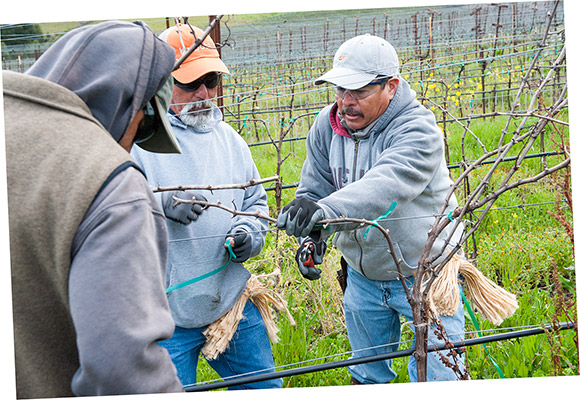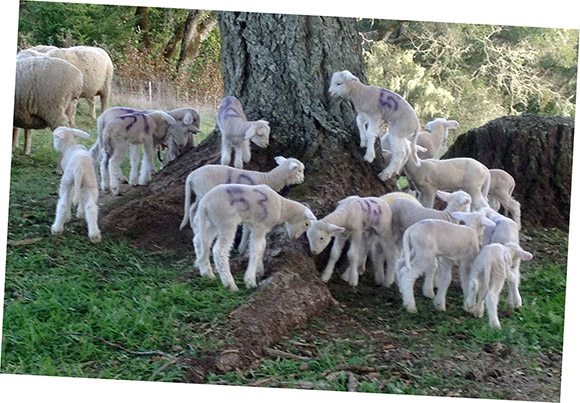In France, Chardonnay is typically fermented in the barrel; the sugar to alcohol fermentation begins first and once the juice is warmed by the primary fermentation, the secondary fermentation, which converts malic to lactic acid, begins. The malolactic (ML) fermentation can add some buttery elements, however, if ML is active when the primary fermentation is active, most of the butter (diacetyl) is blown off. (French vignerons consider excess diacetyl a defect.) Unfortunately, if the ML fermentation finishes before the primary fermentation, the results may be disagreeable. In the 1970's a new style of Chardonnay was trendy in California; a buttery element was added. Butter's bold appearance was probably because nervous, new-world winemakers were overly cautious and let the primary fermentation completely finish before ML was introduced consequently the diacetyl wasn't blown off by the primary fermentation.

![[above]](/images/buttons/arrow_up.gif) Navarro's Hammer Olsen Chardonnay vineyard, March 2011. Jose teaching others how to prune and train the vine into a bilateral cordon. This block, planted in 2007, now yields top-quality Chardonnay grapes that typically are part of our Première Reserve and Anderson Valley bottlings.
Navarro's Hammer Olsen Chardonnay vineyard, March 2011. Jose teaching others how to prune and train the vine into a bilateral cordon. This block, planted in 2007, now yields top-quality Chardonnay grapes that typically are part of our Première Reserve and Anderson Valley bottlings.
Newborn Babydoll lambs, when mature, will spend spring and summer in the vineyard weeding. ![[below]](/images/buttons/arrow_down.gif) During lambing we are with the ewes 24-7; soon after birth we move the ewe and her lamb to a moveable shelter with food and water. We paint the same number on the ewe and lamb in case one of the little guys can't find mama.
During lambing we are with the ewes 24-7; soon after birth we move the ewe and her lamb to a moveable shelter with food and water. We paint the same number on the ewe and lamb in case one of the little guys can't find mama.

Like many winemakers, we were at first attracted by butter bombs but, as we and the wines have aged, we think a heavy dose of diacetyl can prove distracting. None of Navarro's Chardonnays are very buttery, as we now choose strains of malolactic bacteria that produce low amounts of diacetyl, but there is still a bit in our
Première Reserve bottling. This wine, from a grape standpoint, comes from the same fields as the
Première Reserve bottling but in this vintage, not only did we avoid the malolactic fermentation completely, but we also chose the slightly richer lots to balance the increased acidity. Crisp apple/pear flavors with an opulent texture from aging in French oak barrels.
Gold Medal winner. Best of Class.

